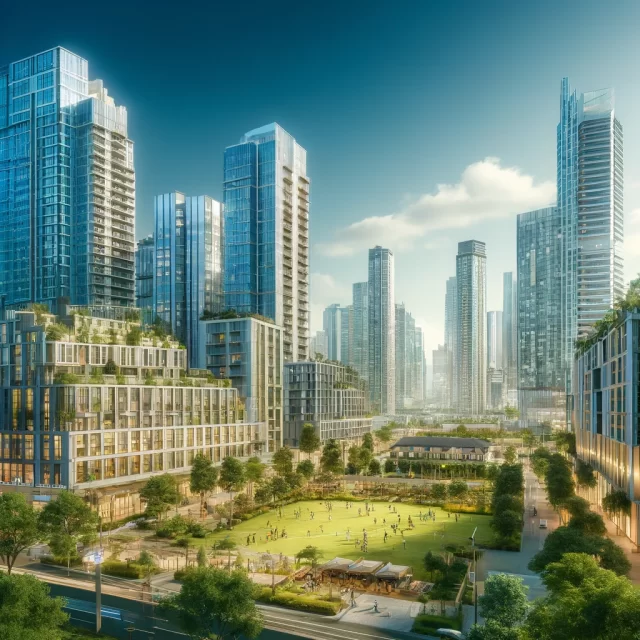The real estate sector in the Philippines has been a significant driver of economic growth, demonstrating resilience and dynamic expansion in recent years. As the country continues to develop, both the opportunities and challenges in this sector are becoming increasingly complex, influenced by economic policies, demographic shifts, and global trends.
Emerging Trends in Philippine Real Estate
- Sustainable Development: There is a growing emphasis on sustainability within the real estate sector. Developers are increasingly incorporating green technologies, energy-efficient systems, and environmentally friendly materials into their projects. Buildings are designed with better waste management systems, rainwater harvesting technologies, and solar panels to minimize environmental impact.
- Rise of Integrated Communities: Mixed-use developments are gaining popularity, combining residential, commercial, and recreational spaces into single, cohesive units. These developments are designed to provide convenience and enhance quality of life by reducing the need to travel for everyday essentials and leisure, thereby also reducing traffic congestion.
- Focus on Affordable Housing: With the Philippine government’s push to reduce the housing backlog, there has been a significant increase in the development of affordable housing projects. Developers are partnering with the government to provide economically priced homes, utilizing innovative construction methods to reduce costs and increase efficiency.
- Technology Adoption: The adoption of technology in real estate has accelerated, with virtual reality (VR) tours becoming a standard marketing tool, especially significant in the time of the COVID-19 pandemic. Additionally, the use of big data and analytics helps developers understand market trends and consumer preferences more accurately, leading to more informed decision-making.
Challenges Facing the Sector
- Infrastructure Development: Although the government has initiated several projects under the “Build, Build, Build” program, the pace of infrastructure development still needs to catch up with the rapid growth of the real estate market. Improved infrastructure is crucial for new developments, particularly in terms of roads, utilities, and public transport systems.
- Regulatory Hurdles: The real estate industry faces various regulatory challenges, including a complex permitting process that can delay projects. Streamlining these procedures could provide a significant boost to the sector by reducing costs and construction timelines.
- Economic Instability: Economic fluctuations can dramatically affect the real estate market. High inflation rates, fluctuating interest rates, and currency volatility can deter investment and affect affordability for buyers. Managing these economic risks is crucial for sustained growth in the sector.
- Natural Disasters: The Philippines is prone to natural disasters such as typhoons, earthquakes, and volcanic eruptions, which pose significant risks to real estate investments. Developing disaster-resilient buildings and communities is becoming a priority, but it also increases the cost of development.
The Role of Condo Developers in Shaping Urban Living
In the urban landscape of the Philippines, condo developers play a pivotal role in accommodating the country’s growing population and urbanization trends. Recognizing the shift towards vertical living in densely populated cities, condo developer Philippines have been at the forefront of transforming city skylines with innovative, high-rise residential solutions. These developers are not just focused on creating living spaces, but are also keen on offering modern amenities and lifestyle conveniences that attract a diverse range of buyers, from young professionals to retirees. Their projects often emphasize strategic locations, accessibility, and the integration of smart home technologies, reflecting the evolving demands of urban dwellers in the Philippines.
The Path Forward
Looking ahead, the real estate sector in the Philippines must navigate these challenges while capitalizing on the emerging opportunities. Emphasis on sustainable and resilient development, combined with innovative financing models and technology integration, will be key to shaping the future of Philippine real estate.
As the country continues to urbanize at a rapid pace, the real estate sector’s role in shaping sustainable, inclusive, and resilient urban landscapes will be more critical than ever. The potential for growth is vast, but so is the responsibility to ensure that this growth is sustainable and beneficial for all stakeholders involved.









